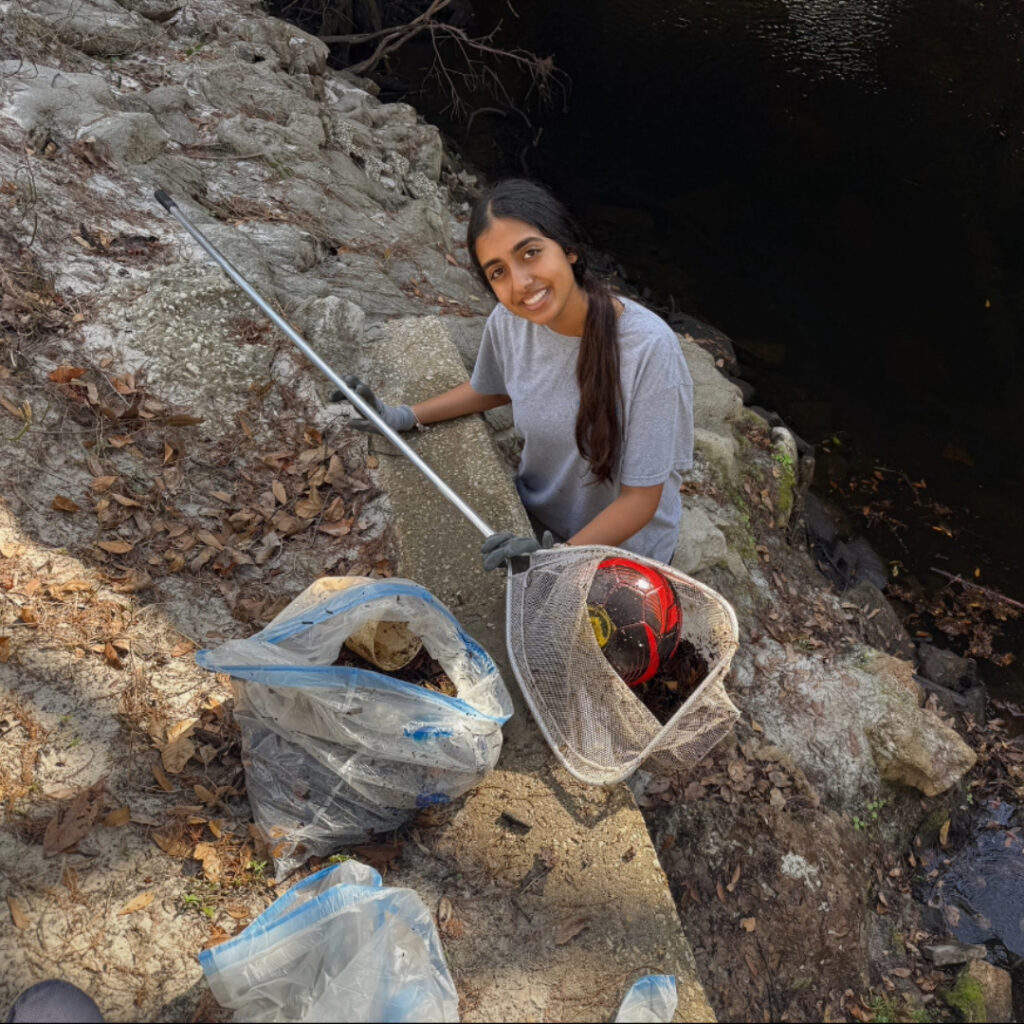Swara Patel, local SCUBAnaut volunteer cleans out watergoat in Anclote River, Pasco County. Image by Swara Patel.
To ensure volunteer safety and effectiveness, Operation TRAP offers a free, 45-minute training that covers site safety, access procedures, and data collection protocols. Volunteers help clean out, organize, and analyze the amount of litter captured by our interceptor devices. Clean up events are used to engage with the community and foster change through data driven education and outreach.
Swara Patel, a returning volunteer and participant in the Adopt-a-Watergoat program through SCUBAnauts, exemplifies the passion driving this initiative. Patel, is a rising junior at Carrollwood Day School in Tampa, Florida, in SCUBAnauts, a marine education program designed for younger individuals and high schoolers.
“Growing up in Tampa and going to beaches like Clearwater Beach and Honeymoon Island, I would notice a lot of pollution. I would see plastic bottles on the beach, and noticed a mass amount of litter in the ocean while scuba diving. Then I would hear stories about animals being washed up on shore, having plastic found inside them. I realized I wanted to do something about it.”
Patel’s monthly commitment to her local watergoat consists of organizing a team of volunteers to clean out any trash captured by the watergoat using nets. Once the garbage is collected, Patel and her team weigh, sort and organize the collected trash. The data is added to the Operation TRAP database that is shared with Water Warrior Alliance, NOAA, and the International Trash Trap Network.
“Devices such as watergoats make it easier for us to access smaller debris and bits of plastic before it gets in our coastal waters, which may become harder to clean up due to currents and waves. Many people do not realize that rivers and waterways are connected to our wider coastal waters,” says Patel. “Being a part of Operation TRAP gives me a sense of accomplishment for helping out the marine community.”
Interested in participating in this award-winning volunteer program?
Volunteer options include:
- Adopt-a-Watergoat – Do you have a group that would like to conduct monthly clean ups? Your group can adopt one of our Watergoats in Pasco County.
- Adopt-a-Tube – We need your help cleaning out and collecting data on the amount of fishing line being recycled.
- Monthly emails – Sign up here to receive our monthly email that list all our volunteer opportunities for the month.
- Calendar of events – See what events are coming up for the rest of 2025 here and sign up to help.
All volunteers will be trained and supplied with the tools necessary to perform the clean ups. If you have any questions, please do not hesitate to email Monica Wilson at monicawilson447@ufl.edu.
This project is supported by the National Oceanic and Atmospheric Administration Marine Debris Program with funding provided by the Bipartisan Infrastructure Law.
The University of Florida (UF), Florida Sea Grant, and UF/IFAS Extension work closely with the Florida Department of Environmental Protection (FDEP) within the regional Aquatic Preserves of the Nature Coast. Funding from FDEP supports UF to carry out monitoring and other programs within the Nature Coast Aquatic Preserve (NCAP) under the guidance of Regional Manager Tim Jones and the regional FDEP management team. NCAP is managed by FDEP’s Office of Resilience and Coastal Protection. The views, statements, findings, conclusions and recommendations expressed herein are those of the author and do not necessarily reflect the views of the State of Florida or any of their sub-agencies. Learn more about Aquatic Preserves at https://floridadep.gov/rcp/aquatic-preserve.
